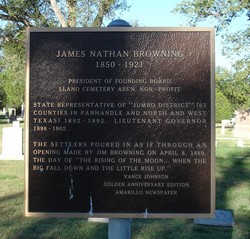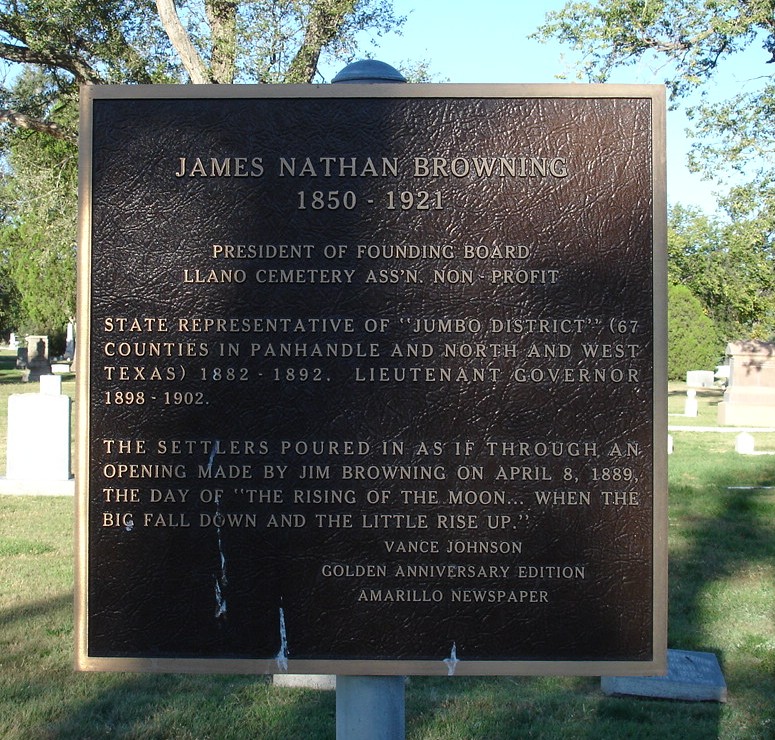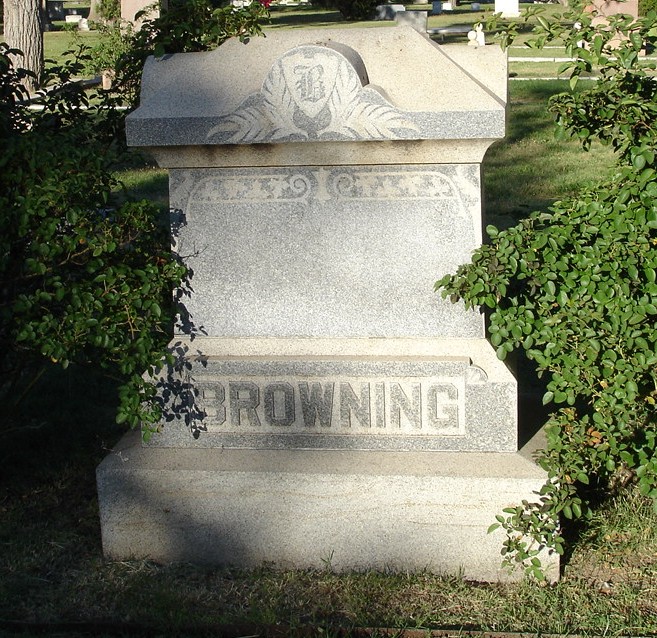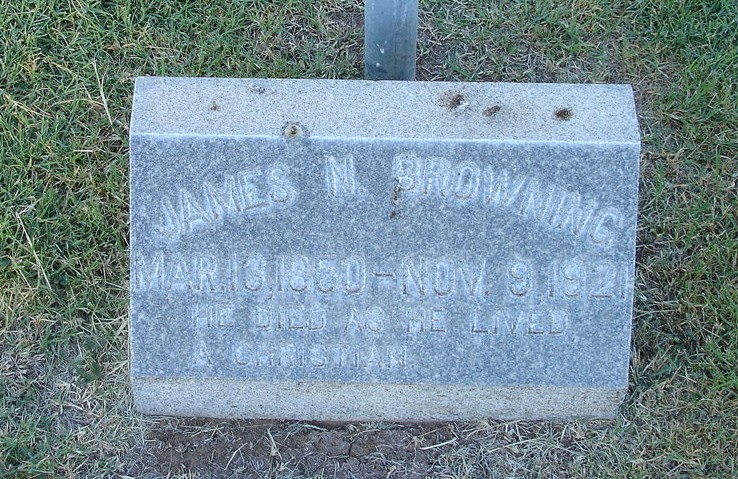J.N. Browning, Lieutenant-Governor, was born near the present town of Amity, in Clark County, Arkansas, March 13, 1850, the son of W. F. and Mrs. Mary L. (Burke) Browning. His father was a native of Alabama, a farmer by occupation, and, at the time of his death, in 1854, surveyor of Clark County, Arkansas. Lieutenant-Governor Browning's grandfather, John Browning, was also a native of Alabama, grew to manhood in that State, served as a Captain in the Seminole War, and afterwards moved to Arkansas with his family and established a farm near Arkadelohia, where he spent the remaining years of an honorable and useful life.
Lieutenant-Governor Browning's parents were married in Arkansas in 1842. His mother is still living. She was born in North Carolina and reared in Alabama, her father, William Burke, a man of mark in the times in which he lived, dying in the latter State about the year 1855. In 1866, Mrs. Browning (now Stegall) moved to Cooke county, Texas, with her family, and during the following year to Shackelford county, where the subject of this notice engaged successfully in stock raising for nine years (part of the time reading law), and was admitted to the bar at Albany, Texas, in 1876. He was for two years justice of the peace and three years (until 1881) county attorney in Shackelford county, and then moved to Mobeetie, Wheeler county, where he accepted an appointment as district attorney, tendered him by Governor Roberts, but resigned it a year later, his private practice having grown to proportions that rendered such a step to his financial interest.
In 1882 he was elected from the Forty-third Representative District (sixty-nine Panhandle counties) to the Eighteenth Legislature, defeating in the free-for-all race two Democratic opponents by a flattering majority. He was re-elected to the House of the Nineteenth Legislature in 1884, and of the Twentieth Legislature in 1886, without opposition; declined to run in 1888, and in 1890 was elected to the House of the Twenty-second Legislature from the same district. In the Twenty-second Legislation he came within two votes of being elected Speaker (vote: Milner, 53; Browning, 50); was Chairman of House Judiciary Committee No. 1 in the Twentieth and Twenty-second Legislature, and in the various sessions of the Legislatures in which he served added steadily to his prestige as a careful and patriotic lawmaker, familiar with the statutes
already on the books and decisions of the courts, possessed of an accurate knowledge of the needs of the State, and actuated by broad and progressive views.
His sturdy manliness, the natural outgrowth of a childhood nurtured in the cradle of civil war, in a section that was the battle ground of contending armies, and a youth spent upon the farm and upon the "range" and inspired by worthy ambition, attracted to him strong and ardent friends in the beginning of his public career, and these have increased in number as succeeding years have widened the scope of his activities and made him better known to the people.
He was nominated for Lieutenant-Governor by the State Democratic Convention at Galveston in 1898, and elected in November following: and in 1900 was renominated for that position by the State Democratic Convention at Waco, and re-elected by an increased majority.
As presiding officer of the Senate he has borne himself with a dignity and fairness, and displayed
a knowledge of parliamentary law, that entitle him to be ranked with the most accomplished of his predecessors in that important office.
In 1888 he moved from Mobeetie to Clarendon, Donley county, and in 1896 to Amarillo, Potter county.
He has been twice married. First, in 1876, to Miss Cornelia E, Beckham, who died at Ft. Griffin, Texas, in 1878, leaving two children, one of whom, a daughter, survives; and, second, in 1879, to Miss Virginia I. Boyman, by whom he has seven children.
He is a life-long Democrat, a lawyer devoted to his profession, and a public man whose record needs no eulogium from a friendly pen. [Year Book For Texas by Cadwell Walton Raines, 1901
J.N. Browning, Lieutenant-Governor, was born near the present town of Amity, in Clark County, Arkansas, March 13, 1850, the son of W. F. and Mrs. Mary L. (Burke) Browning. His father was a native of Alabama, a farmer by occupation, and, at the time of his death, in 1854, surveyor of Clark County, Arkansas. Lieutenant-Governor Browning's grandfather, John Browning, was also a native of Alabama, grew to manhood in that State, served as a Captain in the Seminole War, and afterwards moved to Arkansas with his family and established a farm near Arkadelohia, where he spent the remaining years of an honorable and useful life.
Lieutenant-Governor Browning's parents were married in Arkansas in 1842. His mother is still living. She was born in North Carolina and reared in Alabama, her father, William Burke, a man of mark in the times in which he lived, dying in the latter State about the year 1855. In 1866, Mrs. Browning (now Stegall) moved to Cooke county, Texas, with her family, and during the following year to Shackelford county, where the subject of this notice engaged successfully in stock raising for nine years (part of the time reading law), and was admitted to the bar at Albany, Texas, in 1876. He was for two years justice of the peace and three years (until 1881) county attorney in Shackelford county, and then moved to Mobeetie, Wheeler county, where he accepted an appointment as district attorney, tendered him by Governor Roberts, but resigned it a year later, his private practice having grown to proportions that rendered such a step to his financial interest.
In 1882 he was elected from the Forty-third Representative District (sixty-nine Panhandle counties) to the Eighteenth Legislature, defeating in the free-for-all race two Democratic opponents by a flattering majority. He was re-elected to the House of the Nineteenth Legislature in 1884, and of the Twentieth Legislature in 1886, without opposition; declined to run in 1888, and in 1890 was elected to the House of the Twenty-second Legislature from the same district. In the Twenty-second Legislation he came within two votes of being elected Speaker (vote: Milner, 53; Browning, 50); was Chairman of House Judiciary Committee No. 1 in the Twentieth and Twenty-second Legislature, and in the various sessions of the Legislatures in which he served added steadily to his prestige as a careful and patriotic lawmaker, familiar with the statutes
already on the books and decisions of the courts, possessed of an accurate knowledge of the needs of the State, and actuated by broad and progressive views.
His sturdy manliness, the natural outgrowth of a childhood nurtured in the cradle of civil war, in a section that was the battle ground of contending armies, and a youth spent upon the farm and upon the "range" and inspired by worthy ambition, attracted to him strong and ardent friends in the beginning of his public career, and these have increased in number as succeeding years have widened the scope of his activities and made him better known to the people.
He was nominated for Lieutenant-Governor by the State Democratic Convention at Galveston in 1898, and elected in November following: and in 1900 was renominated for that position by the State Democratic Convention at Waco, and re-elected by an increased majority.
As presiding officer of the Senate he has borne himself with a dignity and fairness, and displayed
a knowledge of parliamentary law, that entitle him to be ranked with the most accomplished of his predecessors in that important office.
In 1888 he moved from Mobeetie to Clarendon, Donley county, and in 1896 to Amarillo, Potter county.
He has been twice married. First, in 1876, to Miss Cornelia E, Beckham, who died at Ft. Griffin, Texas, in 1878, leaving two children, one of whom, a daughter, survives; and, second, in 1879, to Miss Virginia I. Boyman, by whom he has seven children.
He is a life-long Democrat, a lawyer devoted to his profession, and a public man whose record needs no eulogium from a friendly pen. [Year Book For Texas by Cadwell Walton Raines, 1901
Family Members
Sponsored by Ancestry
Advertisement
Advertisement



























